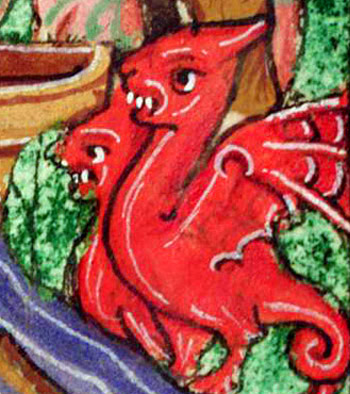Alliterative Morte Arthure
General Information
Plot Summary

After conquering much of Europe, Arthur and his knights spend Christmas at Carlisle. On New Year’s Day a messenger arrives from Lucius, Emperor of Rome, demanding tribute. Arthur is furious and, with the agreement of his knights, declares war on Rome. On receiving this answer, Lucius summons troops from his far-flung territories and travels to Cologne, vowing to re-conquer Arthur’s lands. Arthur appoints his nephew Mordred as regent and sails to the continent with his knights. En route, the king dreams that a dragon defeats a ferocious bear, foreshadowing his victory.
Arriving in Normandy, Arthur learns that a giant is terrorizing the land. On the pretext of a pilgrimage to Mont Saint-Michel, the king leaves his men and sets off alone. Passing the grave of a raped and murdered duchess, he finds the giant feasting on children and wearing a cloak made from kings’ beards. The two fight, wrestling until Arthur slays his enemy. Meanwhile, Lucius lays waste to Burgundy and refuses to leave France. Gawain slays the Emperor’s uncle and is pursued by the Romans until Bedevere ambushes them. While taking their prisoners to Paris, however, the Arthurian knights are ambushed themselves. Many die, but they eventually defeat the Romans again. In retaliation, Lucius orders his men to Soissons, but finds the town already blockaded by Arthur’s army. The British fight bravely, Arthur himself slaying several giants. The Romans retreat once more, but Kay and Bedevere are killed in the battle. The enraged Arthur finally slays Lucius, sending his corpse back to Rome with treasure and a warning: never demand tribute from Britain again.
Arthur travels to Lorraine and attacks a rebellious duke. While besieging the city he sends a group of knights, led by Gawain, to find food. They encounter a richly armed knight, who jousts with Gawain until both are mortally wounded. When he discovers Gawain’s identity, however, the knight heals them both, then helps the small company defeat the duke’s army. Arthur moves on across Europe, conquering cities and consolidating his power until Rome finally surrenders.
That night, however, Arthur dreams that he is surrounded by beasts. Fortune enthrones him at the top of a golden wheel with eight kings around its edge, then spins it to bring him low. His philosophers predict that his reign is nearing its end: each of the Nine Worthies, including Arthur, experience glory then fall, while the beasts represent dangers to England. Hurrying towards Rome, Arthur meets an English knight who tells him that Mordred has usurped his crown and married Guinevere, allowing Danes and Saracens into the kingdom. The king gathers his knights and sails to England, where they fight a sea-battle against Danish ships. When only Gawain’s men manage to land, their small troop is soon surrounded and Gawain is slain by Mordred, his cousin. Fearing Arthur’s wrath, the traitor retreats to Cornwall and Guinevere becomes a nun.
The distraught Arthur retrieves Gawain’s body and weeps for his death and the downfall of the kingdom. Refusing to summon reinforcements, he pursues Mordred to Cornwall, where his knights are vastly outnumbered. Although they fight bravely, Arthur continues to lament their suffering as many die. The cowardly Mordred attacks Arthur in disguise, but the king recognises his sword and finally slays his nephew. Arthur’s surviving knights take their mortally wounded king to Glastonbury, where he dies and is buried with great ceremony.
From: Larry D. Benson, ed. King Arthur’s Death. Exeter: University of Exeter Press, 2003.
Manuscript: Lincoln, Lincoln Cathedral MS 91
Manuscripts
Click a title below to search for all romances in that manuscript.
Modern Editions
A. V. C. Schmidt and Nicolas Jacobs, eds., Medieval English Romances, 2 vols (New York: Holmes & Meier, 1980)
Vol. 2. Pp. 185-195. Lines 2501-2716 only. Edited from Thornton Manuscript.
Charles W. Dunn and Edward T. Byrnes, eds., Middle English Literature (New York: Harcourt Brace Jovanovich, 1973)
Pp. 264-276. Lines 4154-346 only. Edited from Thornton Manuscript.
Edmund Brock, ed., Morte Arthure, or The Death of Arthur EETS o.s. 8 (New York, London, Toronto: Oxford University Press, 1871; rpt. 1961)
Edited from Thornton Manuscript.
Erik Björkman, ed., Morte Arthure, Alt- und mittelenglische Texte, 9 (Heidelberg: Carl Winters and New York: G. E Stechert and Company, 1915)
Edited from Thornton Manuscript.
J. O. Halliwell, ed., Morte Arthure : The Alliterative Romance of the Death of King Arthur (Brixton Hall : For private circulation, 1847)
Edited from Thornton Manuscript.
Larry D. Benson, ed., King Arthurs Death: The Middle English Stanzaic Morte Arthur and Alliterative Morte Arthure (Kalamazoo, Michigan: Medieval Institute Publications, 1994)
Pp. 131-284. Edited from Thornton Manuscript.
Available online at: http://www.lib.rochester.edu/camelot/teams/allitfrm.htmMary Hamel, ed., Morte Arthure: A Critical Edition, Garland Medieval Texts, 9 (New York and London: Garland, 1984)
Edited from Thornton Manuscript.
Mary Macleod Banks, ed., Morte Arthure: An Alliterative Poem of the 14th Century, from the Lincoln MS (London: Longmans, 1900; Reprinted New York : AMS Press, 1974)
Edited from Thornton Manuscript.
Valerie Krishna, ed., The Alliterative Morte Arthure: A Critical Edition (New York: Burt Franklin, 1976)
Edited from Thornton Manuscript.